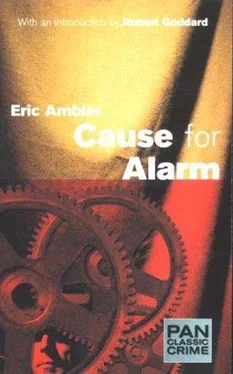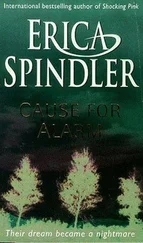Eric Ambler - Cause for Alarm
Здесь есть возможность читать онлайн «Eric Ambler - Cause for Alarm» весь текст электронной книги совершенно бесплатно (целиком полную версию без сокращений). В некоторых случаях можно слушать аудио, скачать через торрент в формате fb2 и присутствует краткое содержание. Жанр: Криминальный детектив, на английском языке. Описание произведения, (предисловие) а так же отзывы посетителей доступны на портале библиотеки ЛибКат.
- Название:Cause for Alarm
- Автор:
- Жанр:
- Год:неизвестен
- ISBN:нет данных
- Рейтинг книги:3 / 5. Голосов: 1
-
Избранное:Добавить в избранное
- Отзывы:
-
Ваша оценка:
- 60
- 1
- 2
- 3
- 4
- 5
Cause for Alarm: краткое содержание, описание и аннотация
Предлагаем к чтению аннотацию, описание, краткое содержание или предисловие (зависит от того, что написал сам автор книги «Cause for Alarm»). Если вы не нашли необходимую информацию о книге — напишите в комментариях, мы постараемся отыскать её.
Cause for Alarm — читать онлайн бесплатно полную книгу (весь текст) целиком
Ниже представлен текст книги, разбитый по страницам. Система сохранения места последней прочитанной страницы, позволяет с удобством читать онлайн бесплатно книгу «Cause for Alarm», без необходимости каждый раз заново искать на чём Вы остановились. Поставьте закладку, и сможете в любой момент перейти на страницу, на которой закончили чтение.
Интервал:
Закладка:
“But you yourself said that the charge was bribery.”
“Until they catch you. Then you’ll get the whole packet.”
“Well,” I said disgustedly, “even if you are right, I still don’t see any alternative for me.”
“The only place you’ll be safe is out of the country, and that’s where we’re going.”
“You seem to forget,” I said witheringly, “that I have no passport.”
“I hadn’t forgotten.”
“Well then!”
“I said we’d talk later…”
“And in the meantime, I suppose…”
“In the meantime,” he interjected, “you get wise to yourself and do as I tell you.”
I shrugged. “Well, I suppose it doesn’t make much difference.”
“It makes a lot of difference. Have a cigarette. It’ll steady your nerves.”
“My nerves,” I snapped, “are perfectly all right.”
He nodded calmly. “That’s good. You’re going to need them in a minute. We’re going to drop off this train when it slows down for the curve at Treviglio.”
I did not answer. Things were moving too quickly for me. Twenty minutes before, I had been a comparatively composed Englishman returning from doing what I was conscious of being a sound piece of work. I had been looking forward to a quiet dinner, a couple of hours in a cinema and an early bed with a new book to read. Now I was a fugitive from the Italian secret police, hiding in lavatories, cheating ticket collectors and contemplating leaving a train in an unconventional and illegal manner. It had all happened far too suddenly. I couldn’t adjust my mind to these new and fantastic circumstances. I found myself wondering seriously whether perhaps by pinching myself I might wake up to find that I was, after all, still in bed in Rome. But no: there was Zaleshoff smoking and gazing intently out of the window and in my pocket there was a safety-razor, a leaking tube of shaving cream and a pair of American underpants. I looked down on to the track by the side of the train. It looked a long way away and dangerous. The train was going too fast for me to see whether the track was of small or large stones. It was a long, even grey-brown smear. It seemed to me that the train had begun to make a curious thumping noise. I tried to separate the noise, identify it, and realised that it was the sound of the blood pumping in my head. I knew suddenly that I was scared, scared stiff.
Zaleshoff touched me on the arm.
“We’re beginning to slow down. We’ll give it another minute, then we’ll get outside on the steps, ready. Don’t forget to let yourself go limply if you can’t keep your feet when you land.”
I nodded, speechless, and looked down again.
To me it seemed as if the train were going as fast as ever. It was running along the top of a steep embankment between ploughed fields. I looked again at the ground streaming past. Then I saw Zaleshoff put his hand on the latch of the door. It was madness, I told myself, madness! We should both break our legs or our arms or we should get flung under the wheels of the luggage van behind us and mangled to death. Suddenly there was a grating noise below us.
“They’re braking,” said Zaleshoff, “come on. You’d better go first.”
He opened the door and the roar of the steel coach seemed suddenly to be lost in the blustering wind.
“Down with you,” said Zaleshoff. “Make it snappy, now.”
I looked down. There were four steps down, then the track. I clutched the rail and went down three steps. The wind tore at my hat. With my free hand I jammed it down over my ears. Then I swung myself round facing the direction we were going. I could see the engine now as it began to round the curve. The smoke was flying in a long cone from the funnel. Below me the ground seemed to be going at a sickening speed. I felt suddenly giddy and retreated a step. I looked up. I had to shout against the wind.
“It’s no good, Zaleshoff, I…”
But he misunderstood me. “We’ll talk later,” he bellowed. “Get on with it.”
He got down on to the step above me. I could feel his knees pressing against my shoulder-blades. I moved down to the bottom step. Now I could see the wheels as they ran screaming over the rails of the curve. I watched them, fascinated. They reminded me irresistibly of bacon-slicing machines. As a boy I had seen a man cut off half his thumb with one of those machines. Grease was oozing out of one of the axle-boxes. Something poked me sharply in the back. It was Zaleshoff’s toe.
“Go on!” he yelled.
I straightened my back, flexed my legs and swung one foot forward slightly. Then I hesitated again. No, I couldn’t do it. We were going too fast. If the train would slow down a little more… but it seemed to be gathering speed now. Then Zaleshoff’s toe jabbed me again. I drew a deep breath, clenched my teeth and jumped.
The next moment the ground was flailing the soles of my shoes with astounding force. I felt myself pitching forward on my face and put out my arms to save myself. My legs strove madly to reach the speed of the rest of my body. But not for long. A bare second later I had tripped. Just in time I remembered Zaleshoff’s advice and let myself go limp. I saw the ground sliding past sideways. Then I hit the edge of the embankment.
The impact nearly stunned me, and before I could stop myself I was tumbling down the side of the embankment. I came to rest at the bottom of it against the concrete stanchion of a barbed-wire fence. For several moments I stayed there, winded. Then, very gingerly, I got to my feet and began to dust myself down. Zaleshoff came scrambling diagonally down the embankment from the point at which he had finished up twenty yards or so away.
“Are you all right?”
I was still short of breath, but I managed a rather quavering affirmative.
“Through the fence,” he panted urgently, as he came up, “we can clean up as we go.”
“What’s the matter?”
“The guard saw us,” he said curtly; “that means that he’ll report the fact at Brescia. We daren’t go into Treviglio.”
“Well, where are we going?”
“We’ll see when we get there. Come on.”
We wormed our way through the fence and set off in silence to skirt the ploughed field. The sun was beginning to go down behind the trees on the horizon when we eventually got on to a road. We turned right, away from Treviglio. Twenty minutes later we walked into a small village. Next to the post office there was a caffe-ristorante.
“This’ll do,” said Zaleshoff.
We went inside and sat down.
“Well,” I said, “what now?” I was feeling tired and shaken.
“We eat and we share a decent bottle of wine if they’ve got one. Then we get down to business.”
The place was small and not too clean. There was a zinc-topped bar and four marble-topped tables covered with white paper napkins. The wall behind the bar consisted of shelves packed tight with bottles. On the other walls were Cinzano posters, a lithograph of Mussolini and a poster advertising Capri. The proprietor was a phlegmatic middle-aged man with a long, greying moustache and amazingly grimy hands. He did not seem in the least surprised by our presence, a fact which I found curious until it came out in the course of our brief conversation with him that he assumed that we were something to do with a mineral water factory close by. We did not correct this impression.
We ate spaghetti and a great deal of bread and drank a tolerable Barbera. By the time the coffee arrived I was feeling very much better. Zaleshoff summoned the proprietor and ordered a bottle of cognac.
“We can’t drink all that,” I protested.
“We’re not going to drink any of it now. But we shall be glad of it later.”
I did not understand him, but I nodded.
Читать дальшеИнтервал:
Закладка:
Похожие книги на «Cause for Alarm»
Представляем Вашему вниманию похожие книги на «Cause for Alarm» списком для выбора. Мы отобрали схожую по названию и смыслу литературу в надежде предоставить читателям больше вариантов отыскать новые, интересные, ещё непрочитанные произведения.
Обсуждение, отзывы о книге «Cause for Alarm» и просто собственные мнения читателей. Оставьте ваши комментарии, напишите, что Вы думаете о произведении, его смысле или главных героях. Укажите что конкретно понравилось, а что нет, и почему Вы так считаете.












